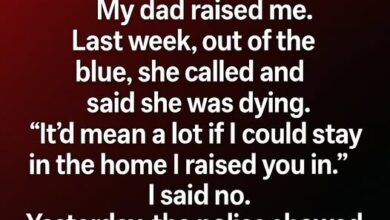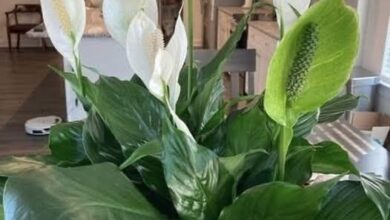
Every Sunday, he gave me $100, and I thought he was simply a kind diner patron at!
I spent months thinking the quiet old man who came into Denny’s every Sunday was just a generous regular with a soft spot for overworked servers. He always sat in the same booth by the window, ordered black coffee and a Grand Slam, and tipped exactly one hundred dollars. No note. No comment. Just a polite nod and a warm smile before he walked out into the parking lot like he was fading back into some other world.
I’d tell my coworkers he reminded me of a character from an old movie — the kind who carried too many memories but never talked about them. I never expected him to have anything to do with me personally. He was just part of my Sunday routine: the kind patron, the recurring kindness, the calm spot in a job that could be chaotic.
Then one night my mom came into my room holding an old, slightly faded photograph. She looked strange — nervous, almost guilty. She set the picture down in front of me. My eyes hit the face immediately. The same man. His smile was younger, but unmistakable
“That man… Jess, he’s your grandfather,” she said.
Everything inside me went still. My grandfather? The man slipping me $100 every week like clockwork? The man I’d been calling “sir” like he was a stranger? I didn’t even know I had a grandfather. My mom never talked about him. I always assumed he’d died long before I was born.
She sat down beside me, rubbing her palms together like she was bracing herself. “We had a falling out. A bad one. He disappeared before you were born, and I didn’t know if we’d ever see him again. I had no way of contacting him.”
It was surreal — almost cinematic — but it felt real in a way that hit me in the chest. All those Sundays… he had recognized me. He had known exactly who I was. And instead of announcing himself, instead of trying to force his way back into our family, he chose to show up quietly. One hundred dollars at a time. Support in the only way he thought he was allowed to offer.
The following Sunday, I couldn’t focus on anything. I kept glancing at the door every time the bell chimed. My hands shook when I poured coffee for customers. My stomach twisted itself into knots. What was I supposed to say? What if he didn’t show up at all? What if he knew I knew and decided it was better to disappear again?
Then he walked in.
He looked smaller than I remembered. Age hung on him in a way I hadn’t noticed before — a slight tremor in his hands, a measured step, eyes that carried too much weight. But when he saw me, there was warmth there. Recognition. Relief, even.
I didn’t let myself overthink it. I walked straight over to his table.
“Are you my grandfather?” I asked. My voice cracked on the last word.
He closed his eyes for a moment, like he was steadying himself. When he opened them, they were already wet. “Yes,” he said quietly. “I am.”
There was no dramatic pause, no speech prepared. Just honesty. And something in his expression — a mix of guilt, hope, and fear — broke whatever hesitation I had left. I leaned in and hugged him. He didn’t move at first, like he wasn’t sure he was allowed to hug me back. Then his arms wrapped around me, tentative but full of emotion he must have been carrying alone for decades.
Once he could speak again, he told me everything.
He and my parents had a huge fight years ago. Pride, misunderstandings, stubbornness — all three played their part. By the time he realized how badly he’d handled things, too much time had passed. He didn’t know how to reach out. So he stayed away, watching from afar when he could. He knew where I worked long before I knew who he was. He would come in every Sunday to see me, even if it was just for a few minutes.
The $100? That was his apology, disguised as generosity. His way of giving me something without taking anything from me in return.
It should have made me angry — the secrecy, the wasted years, the emotional mess of it all. But it didn’t. I saw a man drowning in regret and too afraid to say a single wrong word. I saw someone who’d made mistakes, but who was still trying, quietly, persistently, in the only way he knew how.
Soon, our Sundays turned into real conversations. No more polite chit-chat. No more pretending we didn’t share DNA. He told me stories about my mom when she was a kid — stories she’d never told me herself. Mischief, road trips, the way she used to laugh with her whole body. I showed him pictures of Peanut, my dog, who eventually joined our breakfasts and climbed into his lap like they’d known each other for years.
Eventually, I convinced my mom to come with me one morning. She resisted. Hard. Old wounds don’t heal easily. The first few minutes were stiff, the kind of small talk you make when you’re trying not to reopen past battles. But slowly — painfully, awkwardly — things shifted. Something thawed. They talked, then argued, then talked again, but it was real this time. Honest.
And somewhere between the pancakes and the refilled mugs, they began to find a way back to each other.
The $100 tips stopped. He didn’t need to leave them anymore. And I didn’t need them. What I gained in their place mattered far more — a relationship I never expected to have, a piece of my family history restored, and the realization that kindness can hide stories far deeper than we imagine.
My grandfather taught me something in all this: people carry entire worlds inside them, hidden behind quiet gestures and unfinished conversations. And sometimes the smallest act — a weekly breakfast, a folded bill on a table — is someone’s attempt to rewrite their own mistakes.
I don’t know how much time I’ll get with him. Life doesn’t promise anything. But now, at least, we’re not strangers passing each other in a diner. We’re family, rebuilding something fragile but real, one Sunday at a time.
And honestly? That’s worth more than every $100 bill he ever left behind.




